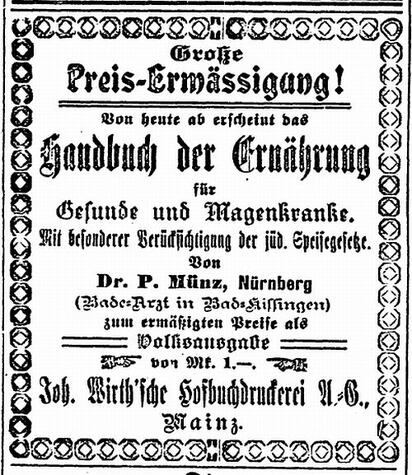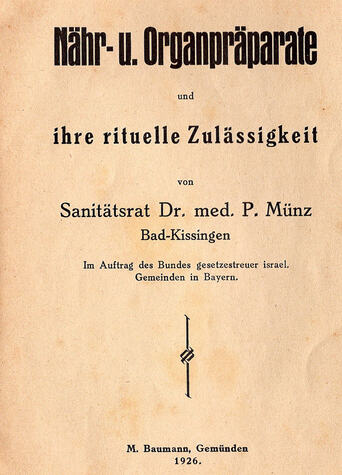personal data
Münz Pinkus Philipp, Dr.
Parents: Lazar Münz and Lea Luise née Kleinmann
Spouse: Martha née Sauerbach
Children: Alfred and Heinrich
Theresienstraße 1 (today's count)
January 1943 deported from Berlin toTheresienstadt
biography
Sanitätsrat (honorary title for a doctor) Dr. med. (DM) Pinkus Philipp Münz was born in Tárnow/ Western Galicia as the son of the Rabbi and author of religious books Dr. (phil.) Lazar Münz (1837-1921) and the merchant’s daughter Lea Luise Kleinmann from Tárnow. Philipp Münz studied medicine. Then he first lived and practiced in Nuremberg. He was married to Martha Sauerbach from Rheinhessen, who was seven years his junior. The couple had two sons, Alfred, born in 1897 and Heinrich who was three years younger. Philipp Münz was allowed to practice as a general practitioner of medicine since July 1892.
In May 1903, the family moved to Bad Kissingen, Theresienstrasse 7 (now 1) and had a doctor’s practice as well as a spa board there. Every year at the end of the spa season, the family returned to Nuremberg, where they had kept their apartment and practice, on a regular basis for the winter months November to April. Münz gave up this address as late as in Autumn 1932 at the age of 68. Apart from his work in the practice, Dr Philipp Münz also worked as a scientist. He wrote several reference books on the topics of digestive organs, nutrition – especially with a focus on Jewish cuisine -, arterial calcification and urine analysis.
Furthermore, he also showed great commitment to social issues. Motivated by a visit to the Protestant Children’s Sanatorium in Salinenstrasse he wished to establish a similar Jewish institution in Bad Kissingen. In 1899, he urgently described the necessity of such a house for chronically ill Jewish children from poor families in the Jewish weekly “Der Israelit” (The Israelite). He summoned the readers: “And now let’s do something! May everyone contribute to this great charitable work according to his capabilities and his magnanimity!” Only six years after this appeal, the society founded in 1901, on June 12, 1905 opened their Israelite Children’s Sanatorium in Salinenstrasse 34. Until the displacement of the Jewish spa guests and the operating ban for the institution in 1938, thousands of children of all denominations could recover from their chronical diseases under the medical care of Philipp Münz often free of charge or for a small contribution. On Dr Münz’s initiative, there were also cure options for employed Jewish girls and women created in 1919 by means of an annex to the buildings. In 1927, the Israelite Cure Hospice for adults was built in the house Altenberg 2.
Philipp Münz showed a patriotic attitude in World War I and volunteered as an army doctor. But even that didn’t protect him – just like all the other Jewish citizens – from repressions and the ensuing ban of practicing their occupation. Few weeks after the death of his wife Martha, the 75-year-old man left the spa town with his son Alfred for ever in July 1939. He moved to Berlin, presumably to his younger son Heinrich, who practiced as a dentist there but could emigrate in time and escape the Holocaust that way. It can only be guessed how difficult the following years were for Philipp Münz. Four days after his 79th birthday, on January 13, 1943, he was deported to Theresienstadt Concentration Camp together with his son Alfred. There he died on August 15, 1944. You can find a more detailed biography of Dr. Philipp Münz on Wikipedia.
(Marlies Walter)


References
Eine noch ausführlichere Biografie von Dr. Philipp Münz finden Sie bei Wikipedia![]()
Bad Kissinger Stolpersteine/Stolpersteinliste![]()
Biographische Datenbank Jüdisches Unterfranken![]()
Gedenkbuch Bundesarchiv Koblenz![]()
Yad Vashem Zentrale Datenbank…![]()
Berichte über die Israelitische Kinderheilstätte![]()
Photo credits
Porträtfoto © Stadtarchiv Bad Kissingen
Werbeanzeige © Zeitschrift "Der Israelit", 18.04.1904 entnommen aus Judaica Alemannia Bad Kissingen![]()
Veröffentlichung © Miriam Kreisel
Back